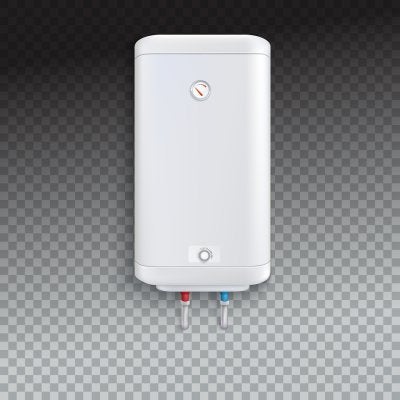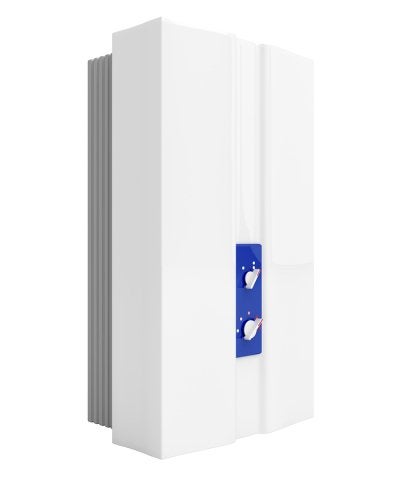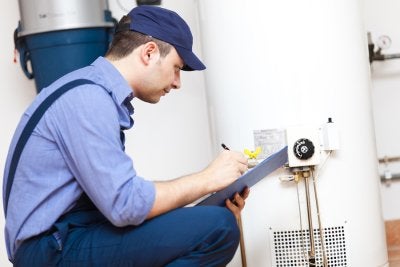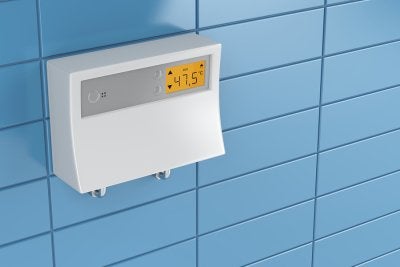-
Is Now the Right Time to Upgrade to a Tankless Water Heater?
There is really no wrong time to make an upgrade, and switching to a tankless water heater in Jacksonville is exactly that. Tankless water heaters boast many advantages that other types of water heaters cannot, making them an increasingly popular choice. Switching to this type of unit is good for the environment as well as your bank account, and a qualified plumber should have no problem helping you make the conversion. If you have been wondering if it’s time to upgrade to a tankless water heater, feel free to keep reading and find out.
After hearing about the benefits of tankless water heaters, you might already be itching to make the switch. The good news is that there is no reason to wait. Tankless water heaters are more efficient and convenient than traditional water heaters, and they can be ideal for any type of home. They are smaller, making them appealing options for those who don’t have much space to work with, and they are more energy-efficient and can keep your bills low. Tankless water heaters are even more durable than conventional water heaters, so talk to your plumber about switching over to a tankless model.

-
3 Reasons Homeowners Love Tankless Water Heaters
Shopping for a new water heater can be a daunting decision making process. Whether your current hot water heater has reached the end of its lifespan, or you are seeking better efficiency from your current water heater system, you may want to talk to your plumber serving Jacksonville about the benefits of installing a tankless water heater . A tankless hot water heater will provide you with exceptional reliability and ease of maintenance, while also making sure that you never run out of hot water at home. Let’s review the top three reasons why homeowners choose to make the switch to tankless water heaters.

Improved Efficiency
A conventional hot water heater can be a major drain on your monthly energy bills. Since conventional hot water heaters store heated water for future use, they use electricity or natural gas throughout the day and night. A tankless hot water heater can boost the efficiency of your water heating system by up to 50 percent. Homeowners who want to cut back on their monthly bills love the improved efficiency that tankless units have to offer.
Compact Design
Along with saving you on your monthly bills, a tankless water heater can also save space in your home. When compared to conventional water heaters, tankless water heaters are extremely compact and space saving. Rather than requiring bulky tanks, tankless water heaters produce hot water as it flows through your plumbing system. Homeowners who want additional storage space or living space will enjoy the compact design of a tankless water heating unit.
Fantastic Longevity
After you have installed a tankless water heater in your home, you can rest assured that your system will last for an extended period of time. In fact, the life expectancy of a tankless water heater is up to a decade longer than a conventional system. With their great efficiency, space saving construction, and long lifespans, tankless water heaters are terrific investments for many households.
-
Finding the Best Faucet for Your Remodel
If you are dissatisfied with the performance or appearance of your current water faucet, you may want to consider working with your plumber to install a brand new faucet for your home. By replacing your faucet, you will be able to select a model that matches with your bathroom design and that is friendly to the environment. A kitchen remodeler serving Jacksonville will be able to answer all of your questions about selecting the right faucet for your needs. After your kitchen remodel has been completed and you have chosen a new faucet for your space, you can expect to save significantly on your monthly water bills. To take a tour of some tips for selecting a new faucet for your kitchen or bathroom remodel, check out this video.
-
Finding the Right Water Temperature for Your Tankless Heater
If you’re interested in installing a tankless water heater near Jacksonville , you should contact a plumber for professional water heater installation. When installed and operated correctly, a tankless water heater can save you money on your water bills and energy bills. Tankless water heaters provide instant hot water only when you need it, rather than storing hot water in a tank like traditional water heaters.
Your on-demand water heater will only heat water as needed, thus eliminating the risk of heat loss and water evaporation. Tankless water heaters are available as natural gas, propane, solar, and electric water heaters. Many tankless water heaters come with a remote control that allows you to easily change the set point temperature of the water heater.
Because your tankless water heater does not consume electricity or gas when water is not in demand, you can set the water temperature slightly higher than you would with a traditional water heater. The standard temperature for a tankless water heater is 120 degrees. This temperature allows you to add the right amount of cold water to your shower or tub to quickly and efficiently create the ideal bathing temperature.

-
How to Switch to a Tankless Water Heater
Have you been thinking about installing a tankless water heater in your home? There’s no better time to do it than right now. A plumber serving Jacksonville can take out your old standard water heater that is equipped with a large storage tank and replace it with a new energy-efficient tankless water heater that will save you money in the long run and deliver hot water to your home on demand. Check out how to make the switch to a tankless water heater below.

Hire a Licensed Plumber to Inspect Your Plumbing System
When you install a tankless water heater in your home, you will need to do more than just swap out your old water heater. You will need to prepare your entire plumbing system for your new water heater. In some cases, a plumber may decide that it would be more beneficial for you to install smaller tankless water heaters in each bathroom in your home as opposed to simply installing one main whole home tankless water heater. It all depends on how your individual home is set up.
Find the Tankless Water Heater That Is Right for Your Home
Once you have had a plumber take a look at your plumbing system, you should speak with him or her about which tankless water heater would be best for your home. Shop around and look at lots of different tankless water heaters until you find the one that works for your specific situation. It’s important to remember that, while most tankless water heaters will cost more than standard water heaters, your investment will pay off in the end in the form of dramatically lower energy bills.
Install Your New Tankless Water Heater With the Help of a Plumber
You should never attempt to install a tankless water heater on your own. If you don’t install it properly, it could pose a threat to both you and your home. Use a licensed plumber to install your new water heater, and you will typically be able to start using it within a matter of just hours.
-
Save Money and the Environment at the Same Time
By now, you’re probably well aware of what it means to go green. As a homeowner, it’s sensible to make eco-friendly choices when it comes to your home. Not only are energy-efficient appliances and fixtures good for the environment, but they also can save you a lot of money on your monthly energy bills. Here are some good reasons to make environmentally conscious decisions regarding your home’s plumbing. For more information, contact Eagerton Plumbing in Jacksonville today.

Upgrade Your Old Hot Water Heater
An appliance in the home that uses a lot of energy is your hot water heater. The most common type of water heater found in homes is a standard storage-tank model—a large cylindrical unit that houses a reservoir of heated water that’s constantly kept at a set temperature. Older storage-tank water heaters tend not to be as energy efficient as newer models, which are insulated and have better water-heating capabilities. If your current water heater has been running for 10 years or more, consider upgrading to an insulated storage-tank water heater, a solar-powered unit, or a tankless water heater.
Switch to Water-Saving Toilets and Bathroom Fixtures
Conventional toilets are water wasters—the amount of water used with each flush tends to be excessive and unnecessary. Energy-efficient toilets use water sparingly when flushed, and many offer innovative flushing technologies that can effectively accommodate both liquid and solid waste accordingly. If you’re planning a bathroom remodel, opt for a dual-flush toilet. Also, replace dated faucets and showerheads with fixtures that have aerating mechanisms. By adding air to water, aerators create the sensation of strong water pressure while using very little water.
Insulate Your Pipes
By insulating your home’s plumbing pipes, you can rest assured that your water is kept either warm during the cold months or cool during the summer for a longer period of time—lessening or eliminating the need to use more energy to heat or cool the water in your pipes.
-
Should You Switch to a Tankless Water Heater?
Should You Switch to a Tankless Water Heater?
Do you have a standard storage-tank water heater that’s on its way out? If so, you’re probably looking into having it replaced. But with so many options on the market today, which hot water heater is the right one for your home? You could choose to replace your old water heater with another storage-tank model, or you could take the opportunity to switch to a tankless water heater in Jacksonville . Here are some things to consider when making your decision to switch. When in doubt, consult with your local plumber.

What a Tankless Water Heater Is
Like its name suggests, a tankless water heater does not have a storage tank that houses a reservoir of continuously heated water that is available for immediate use. This type of hot water heater is much smaller than its storage-tank cousin, and since it only heats water when needed, it can be relatively energy efficient when compared to a traditional model.
What You Should Take into Consideration
You shouldn’t be too hasty when making the decision to switch over from a standard storage-tank water heater to a tankless one. Be sure to do as much research on tankless water heaters as you can, and talk with a plumbing professional—that way, you can be sure that a tankless water heater is right for you. Before you decide, you should figure out how much hot water you and your family actually use on a daily basis. For example, if you have a large family that requires the use of a lot of heat water, a tankless system may not be a good fit for your home.
The Pros and Cons of Tankless Water Heaters
There are some notable pros and cons regarding tankless water heaters. Pros: Tankless systems don’t take up as much space as standard hot water heaters, don’t need to keep reservoirs of continuously heated water, and may lower your monthly energy bills if you install the right model. Cons: Tankless water heaters cost more upfront to purchase and install than traditional models.
-
Tankless Water Heaters 101
If you often think about what you can do in order to enhance the efficiency of your home, you may want to look into a tankless water heater in Jacksonville. These types of water heaters operate in a much different fashion than their traditional counterparts, meaning that they come with their own set of pros and cons. Read on if you are interested in learning about the ways that tankless water heaters differ from traditional water heaters as well as their advantages and disadvantages.
 How They Work
How They Work
A traditional tank water heater contains a certain amount of water, which it constantly works to keep warm in case you need it. Tankless water heaters, on the other hand, are not concerned with keeping your water heated at all times; instead, tankless water heaters only heat the water when you need it. It is because of these mechanics that tankless water heaters are sometimes called “on demand” water heaters. A tankless water heater uses a heat exchanger that is automatically activated when you turn on the handle for hot water. Whole-house heaters offer hot water throughout the entire house, while point-of-use heaters are designed to handle one or two outlets at a time.Advantages
Tankless water heaters enjoy a number of advantages over traditional tank heaters. Since these heaters only heat your water when you need it, a substantial amount of energy is retained. Since this type of appliance enjoys a much greater efficiency, you will reduce your carbon footprint and enjoy energy savings as long as your tankless water heater is in use. Many units—especially point-of-use models—are also small enough to be conveniently situated around the house. Owners of tankless water heaters never have to worry about running out of hot water, and their heaters tend to last up to a decade longer .Drawbacks
Although these alternatives to tank water heaters are known for their efficiency, gas units do contribute to greenhouse gas emissions; you will also need steel tubing to vent these units. Tankless heaters cost a great deal more than tank water heaters, although it is important to keep their savings value in mind. -
Reasons to Switch to a Tankless Water Heater
Everybody needs to heat the water in their homes somehow, and there is more than one way of getting it done. Hot water heaters in Jacksonville come in tank and tankless varieties, and each works a little bit differently; however, tankless water heaters tend to receive praise for their additional benefits. Keep reading to learn about a few reasons that you might want to switch to a tankless water heater.
Many people make the switch from a standard tank hot water heater to a tankless water heater because of the many ways in which it can save them money. You will immediately become eligible for a federal tax credit upon purchasing a tankless water heater, and this rebate can save you a few hundred dollars. Tankless hot water heaters are also cheaper to run than their counterparts that use tanks. This type of heater can save you a substantial amount of money on your energy bills every month, allowing it to eventually pay for itself. With a standard hot water heater you may have to wait a while before actually receiving hot water from your faucet, and it may cool down when the water in the heater is replaced; tankless heaters, on the other hand, provide limitless hot water.

-
How Tankless Water Heaters Work
If you’re thinking about replacing your old water heater, consider upgrading to a tankless unit instead. These revolutionary water heating units provide instantaneous and unlimited hot water, all the while requiring less energy than conventional models. In other words, you’ll lower your energy bills while enjoying on-demand hot water anywhere in your home, even if you decide to take a hot shower while the laundry machine and dishwasher are running. Before you contact a water heater installation company in Jacksonville , read this brief article to get an idea of how tankless water heaters work.

Heat Exchanger
Tankless water heaters, also known as on-demand water heaters, provide piping-hot water when you want it thanks to a powerful heat exchanger. A heat exchanger is simply a device that transfers heat from one source to another. In a tankless water heater, the heat exchanger transfer heat generated by electric coils or a gas-fired burner to the water that comes out of your faucet. The heat exchanger inside a tankless water heater is activated by the incoming flow of water, which eliminates standby heat loss and makes tankless systems more efficient than conventional water heaters.
Point-of-Use vs. Whole-House System
Tankless water heaters come in two varieties: point-of-use and whole-house heaters. Point-of-use water heaters are more compact and used to heat water for one of two outlets only. Whole-house systems, on the other hand, are larger and can operate more than one outlet at a time. This means no more fighting in your house about who gets to take a hot shower next or who used up all the hot water.
If you think a tankless water heater is right for your home, contact a Jacksonville plumbing company that specializes in water heater repair and replacement. Your plumber will help you select the perfect unit based on your household’s hot water needs.
RECENT POSTS
categories
- Uncategorized
- Water Heater Installation
- Tankless Water Heater
- Plumbing Services
- Bathroom Remodeling
- Hot Water Heater
- Plumber in Jacksonville
- Water Heater Repair
- Eagerton Plumbing
- Eco-Friendly Plumbing Repair
- Water Damage
- Plumbing Leak
- Sewer Line Repair
- Infographic
- Clogged Drains
- Kitchen and Bathroom Remodel
- Bathroom Plumbing
- Residential Plumbing Services
- Garbage Disposal
- Toilet Repair
- Water Heater Replacement
- Water Conservation
- Emergency Plumbing
- Commercial Plumbing Services
- Kitchen Design Inspiration
- Kitchen Remodel
- low-flow toilets
- Leaky Faucet
- Conserve Water
- Drain Pipes
- Kitchen Sinks
- Vessel Sink
- Plumbing Problems
- Water Leak
- Commercial Remodeling Contractors
- Drain Cleaning Services
